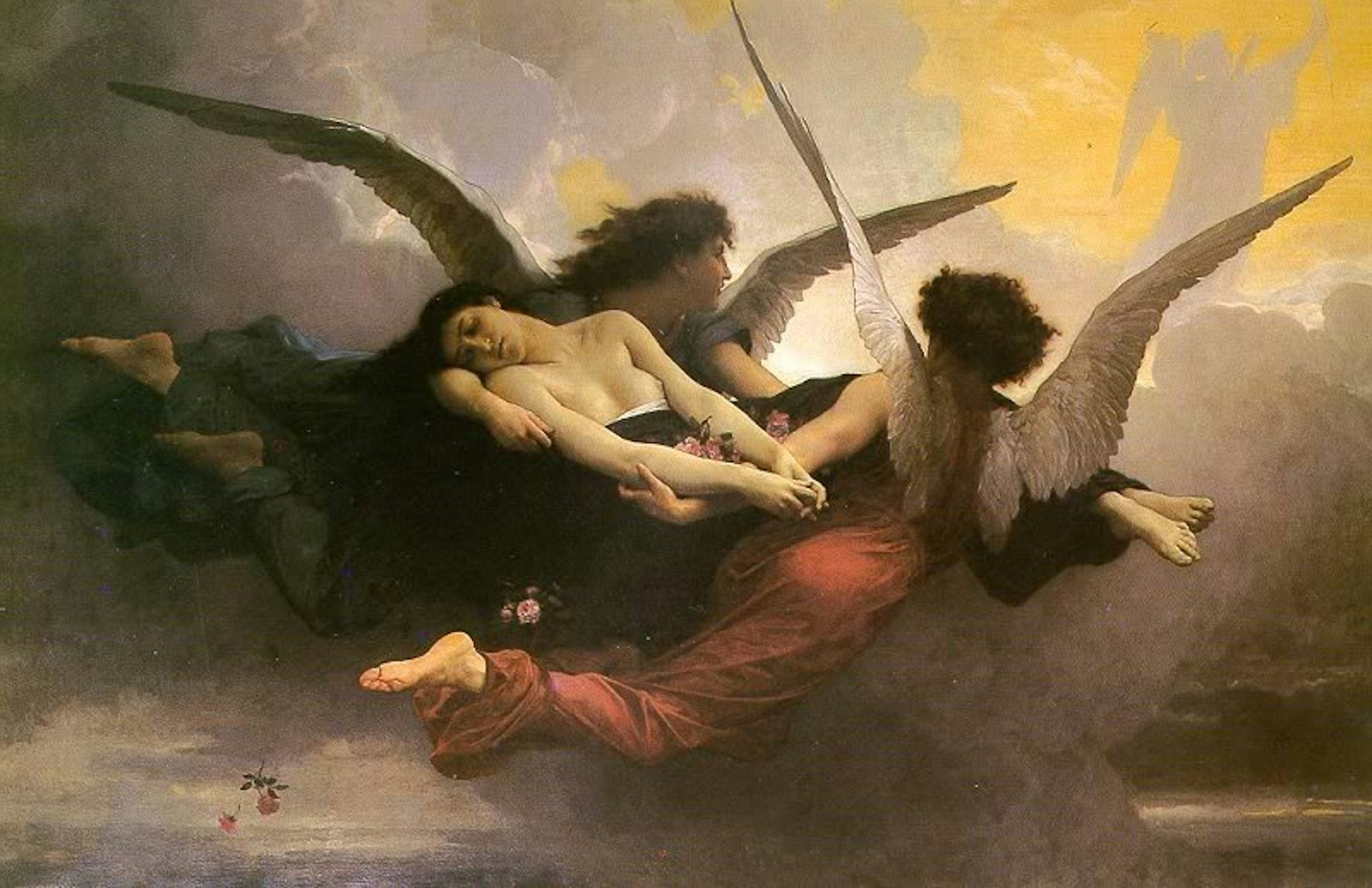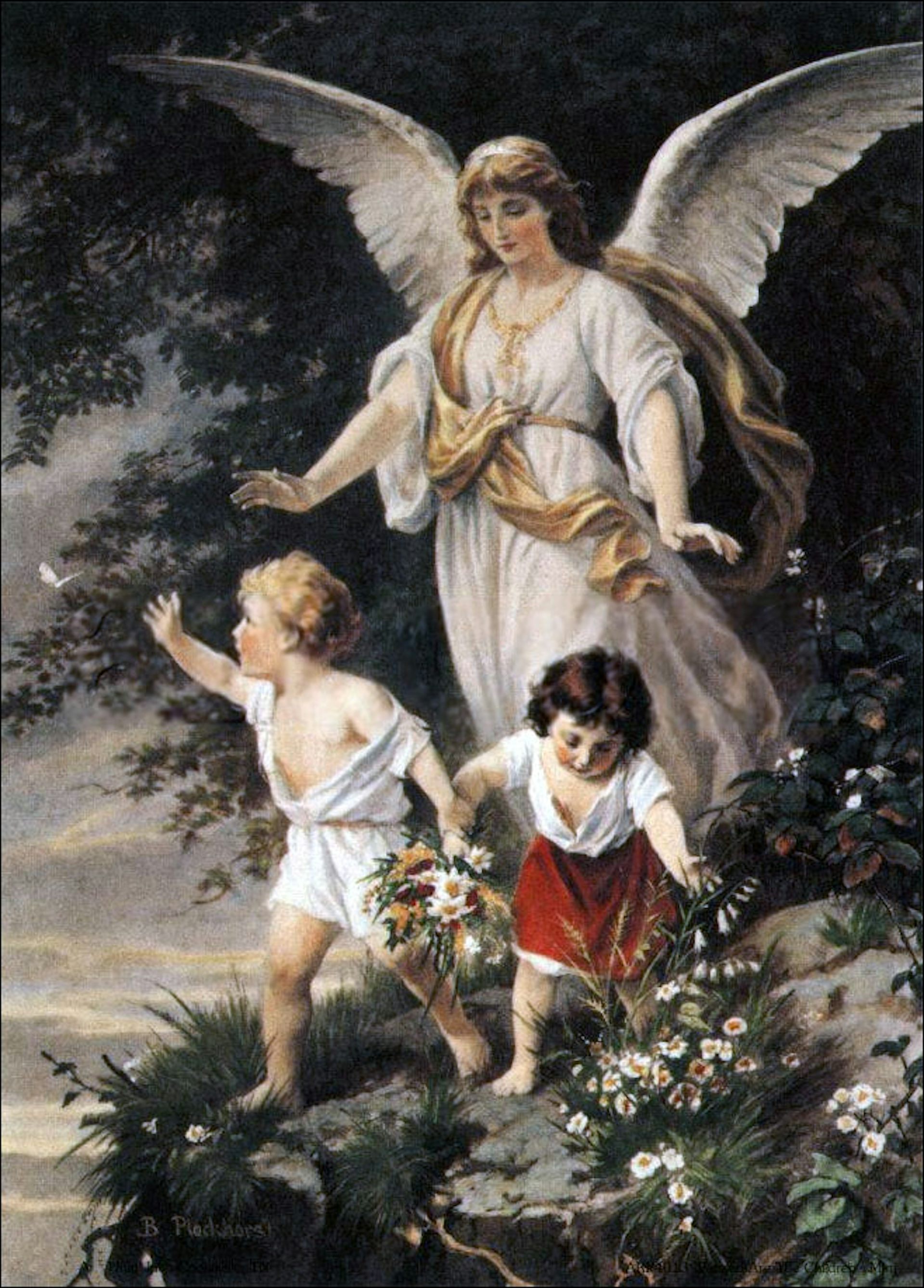Are Christian souls gendered?
In a fascinating analysis of how the Christian notion of the 'soul' evolved to suit local political needs and to pander to popular demand, Professor Philip C. Almond, Emeritus Professor in the History of Religious Thought, The University of Queensland, explains how Christian ideas about the soul have changed since the notion was adopted from the Greek Platonists in the late second century CE, the idea of an immortal soul being absent from both the Old and New Testaments. Until then, Christians had used the Hebrew notion of a human being a single entity composed of both spiritual and physical parts.
For 'spiritual' parts read 'magic ingredient' making it alive. In fact we can see remnants of the lack of belief in immortality in verses such as this The following bible verses that seem to have escaped the editors' notice and been included in the modern editions.
From the Old Testament from a time when ideas of God's omniscience hadn't formed and death was seen as the end:
Man that is born of a woman is of few days and full of trouble. He cometh forth like a flower, and is cut down: he fleeth also as a shadow, and continueth not.Clearly, the idea that it didn't matter how you lived your life as it made no different in the long run, was not what the church authorities needed the masses to believe. What they needed was the ability to promise a reward for good behaviour, unquestioning obedience and compliance with dogma, which the dead couldn't complain about and couldn't report back to the living and reveal that it was a false promise and what they'd been sold was a pig in a poke.
And doth thou open thine eyes upon such an one, and bringest me into judgment with thee? Who can bring a clean thing out of an unclean? not one.
Seeing his days are determined, the number of his months are with thee, thou hast appointed his bounds that he cannot pass; Turn from him, that he may rest, till he shall accomplish, as an hireling, his day. For there is hope of a tree, if it be cut down, that it will sprout again, and that the tender branch thereof will not cease. Though the root thereof wax old in the earth, and the stock thereof die in the ground; Yet through the scent of water it will bud, and bring forth boughs like a plant.
But man dieth, and wasteth away: yea, man giveth up the ghost, and where is he? As the waters fail from the sea, and the flood decayeth and drieth up: So man lieth down, and riseth not: till the heavens be no more, they shall not awake, nor be raised out of their sleep.
Job 14:1-12:
So I reflected on all this and concluded that the righteous and the wise and what they do are in God’s hands, but no one knows whether love or hate awaits them.
All share a common destiny—the righteous and the wicked, the good and the bad, the clean and the unclean, those who offer sacrifices and those who do not.
As it is with the good, so with the sinful; as it is with those who take oaths, so with those who are afraid to take them.
This is the evil in everything that happens under the sun: The same destiny overtakes all. The hearts of people, moreover, are full of evil and there is madness in their hearts while they live, and afterward they join the dead. Anyone who is among the living has hope — even a live dog is better off than a dead lion!
For the living know that they will die, but the dead know nothing; they have no further reward, and even their name is forgotten.Ecclesiastes 9:1-5:
So, the idea of an immortal soul was pinched from the Greek Platonists and inserted into Christianity, complete with the idea that the soul doesn't have a gender.
The following article is reprinted from The Conversation under a Creative Commons licence and reformatted for stylistic consistency. The original may be read here:

Are Christian souls gendered?
Shutterstock
Within Christianity, the question of the nature of human identity has been a messy and complex one.
For its first 200 years, Christianity adopted the Hebrew understanding of human identity as a unity of physical and spiritual parts, not divided into body and soul. There is no concept of the immortal soul in the Hebrew Old Testament nor in the Christian New Testament.
But in the late second century, Christianity happily absorbed the doctrine of the soul from the Greek Platonic tradition. From that time on, humans were thought of as hybrids – consisting of an immortal soul united with a mortal body.
How body and soul related to each other has been, in Western thought, a never ending matter for philosophical speculation.
Clearly, bodies were gendered male or female. But souls were not. They were, after all, non-corporeal, spiritual entities. And thus, there was nothing to differentiate the sexes. As Cyril, Bishop of Jerusalem (c. 315-86), put it,
the soul is immortal, and all souls are alike both of men and women; for only the members of the body are distinguishable.In this way souls were rather like angels who were also, as spiritual creatures, non-gendered.
Angels, however, could assume virtual, ethereal bodies. But, even then, they were generally imagined as assuming male bodies. For this reason, angels have traditionally had men’s names – Gabriel, Michael, Raphael. Then, in the 19th century in the Romantic movement especially, angels became less attached to the Christian tradition. They shifted from supporting kings and enabling sorcerers to benign beings whose activities remained in heaven. They were feminised and ethereal, less based on their representation in the Bible and more on classical Greek sources, They began to assume female, even androgynous, bodies. From then on, women (but no longer men) could be and would be called (metaphorically, at least) “angels”.
Generally speaking, the Christian tradition at that time held that, in life immediately after death, as immortal souls that had left our gendered mortal bodies, we would no longer be essentially male or female.
That said, souls had a kind of quasi-bodily nature – they were depicted as leaving the body, were spatially located in heaven, hell, or purgatory, and could experience rewards and punishments after death.
But the situation was complicated by the fact that we would be eventually re-united with our bodies when they arose from the dead on the Day of Judgement.
We would then go forward into eternity as non-gendered souls re-united with gendered bodies, and with all our imperfections removed.
Of course, the issue of gender in Christianity was further complicated by the statement in the book of Genesis that both men and women were made in the image of God. This was never (well, hardly ever) read as meaning that God had a physical body (either male or female). Rather, the image of God was located in the spiritual qualities of humans.
That said, there was a general belief that women were made less in the image of God than men. There was a key biblical precedent for this. Man “is the image and glory of God,” declared Saint Paul, “but the woman is the glory of the man”.
And the woman, he went on to say, was created for the man and not vice versa. So, while the Biblical texts were used, on occasions, to justify the least assertive of feminisms, they more often justified the most aggressive of misogynies.
Generally, up until the 18th century, female bodies were thought of theologically as a part of the male body as in the Genesis 2.22 account of Eve being made from a rib of Adam; or philosophically as in Aristotle’s dismissal of the female as a defective male.
The rise of biology
In the 18th and 19th centuries, when the idea of “gender” came to be dominated by the biology of sex, along with an increasing social differentiation between men and women, the “one-sex” model with the male as human “prototype” (with a non-gendered soul) came to be dominated by the “two-sex” model with which we are familiar.
In this modern version, male and female bodies are seen as fundamentally different. Biology came to dominate theology and philosophy.
As biological understandings of human identity came to dominate, so the traditional understanding of the non-gendered soul began to disappear.

William-Adolphe Bouguereau (1825–1905): Depiction of a soul being carried to heaven by two angels.
Wikimedia Commons
By the middle of the 19th century, the idea of the afterlife as an eternity spent worshipping God was replaced in popular culture by an eternity where we would spend time with former friends, families, and even pets. Heaven became a place of companionship, of amiable conversation, of spiritual progress, and intellectual development.
So, the modern heaven is a secular one in which God, and for that matter souls, play little role. It is no longer one of “embodied” souls but of “spiritual” bodies, enjoying for eternity the best of this world in the next. And, in this vision of the afterlife, we essentially and eternally are gendered in spiritual bodies in a way that reflects our physical bodies in this life, whatever form that may have taken. All this should remind us that our understanding of what counts as male and female is a very recent one. Rather, in the history of Western thought, notions of human identity have been much more fluid and unstable than we currently realise.
In the history of the idea of “human identity”, the meanings of “man” and “woman” have been as much socially constructed as biologically determined.
Granted the weird and wonderful history of the debate around human identity within Western civilisation, we would do well not to stake too much of a claim about the essence of the human as grounded in the modern biological understanding of male and female as binary opposites.
Philip C. Almond, Emeritus Professor in the History of Religious Thought, The University of Queensland






No comments :
Post a Comment
Obscene, threatening or obnoxious messages, preaching, abuse and spam will be removed, as will anything by known Internet trolls and stalkers, by known sock-puppet accounts and anything not connected with the post,
A claim made without evidence can be dismissed without evidence. Remember: your opinion is not an established fact unless corroborated.